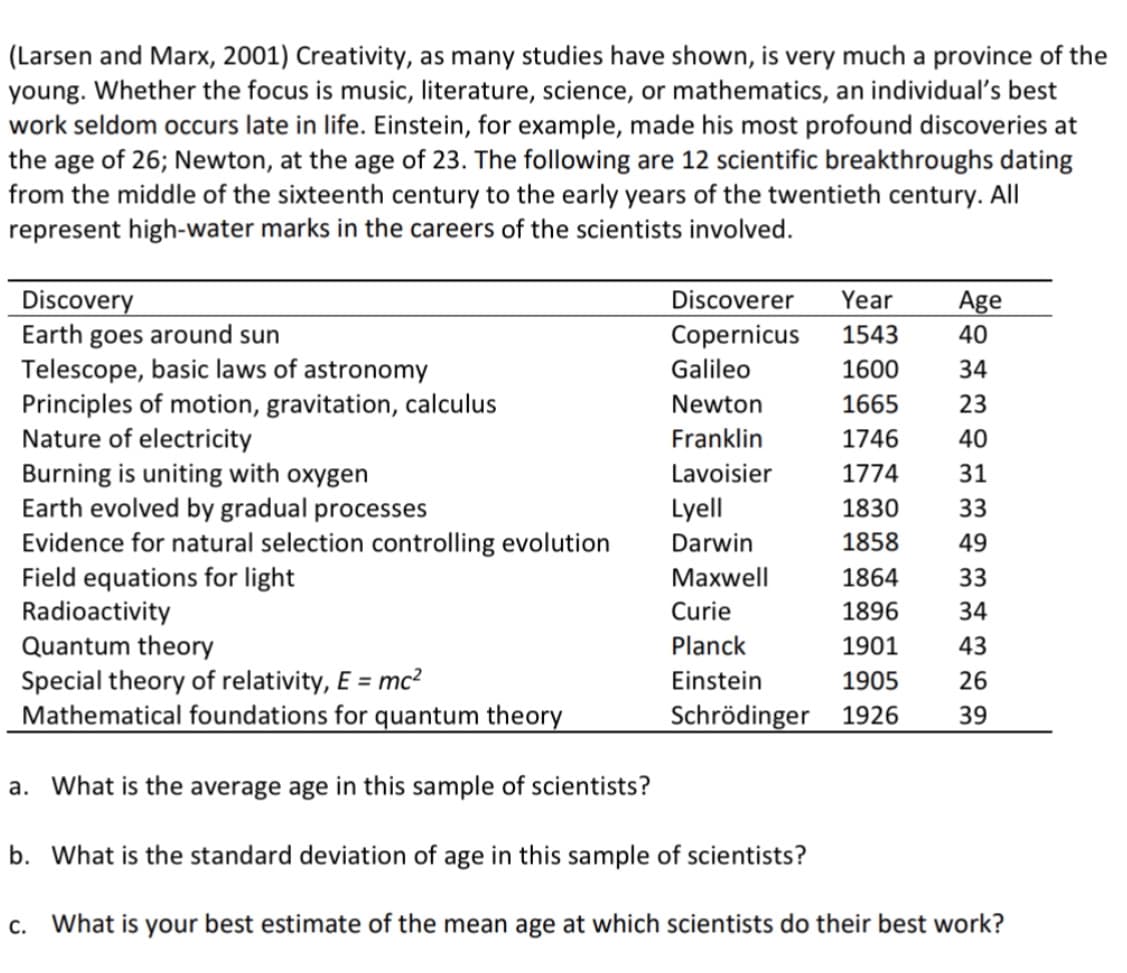(Larsen and Marx, 2001) Creativity, as many studies have shown, is very much a province of the young. Whether the focus is music, literature, science, or mathematics, an individual's best work seldom occurs late in life. Einstein, for example, made his most profound discoveries at the age of 26; Newton, at the age of 23. The following are 12 scientific breakthroughs dating from the middle of the sixteenth century to the early years of the twentieth century. All represent high-water marks in the careers of the scientists involved. Discovery Earth goes around sun Telescope, basic laws of astronomy Principles of motion, gravitation, calculus Nature of electricity Burning is uniting with oxygen Earth evolved by gradual processes Evidence for natural selection controlling evolution Field equations for light Discoverer Copernicus Galileo Newton Franklin Lavoisier Lyell Darwin Maxwell Curie Planck Einstein Year 1543 1600 1665 1746 1774 1830 1858 Age 40 34 23 40 31 33 49 1864 33 1896 34 1901 43 1905 26 Schrödinger 1926 39 Radioactivity Quantum theory Special theory of relativity, E = mc² Mathematical foundations for quantum theory a. What is the average age in this sample of scientists? b. What is the standard deviation of age in this sample of scientists? c. What is your best estimate of the mean age at which scientists do their best work?
(Larsen and Marx, 2001) Creativity, as many studies have shown, is very much a province of the young. Whether the focus is music, literature, science, or mathematics, an individual's best work seldom occurs late in life. Einstein, for example, made his most profound discoveries at the age of 26; Newton, at the age of 23. The following are 12 scientific breakthroughs dating from the middle of the sixteenth century to the early years of the twentieth century. All represent high-water marks in the careers of the scientists involved. Discovery Earth goes around sun Telescope, basic laws of astronomy Principles of motion, gravitation, calculus Nature of electricity Burning is uniting with oxygen Earth evolved by gradual processes Evidence for natural selection controlling evolution Field equations for light Discoverer Copernicus Galileo Newton Franklin Lavoisier Lyell Darwin Maxwell Curie Planck Einstein Year 1543 1600 1665 1746 1774 1830 1858 Age 40 34 23 40 31 33 49 1864 33 1896 34 1901 43 1905 26 Schrödinger 1926 39 Radioactivity Quantum theory Special theory of relativity, E = mc² Mathematical foundations for quantum theory a. What is the average age in this sample of scientists? b. What is the standard deviation of age in this sample of scientists? c. What is your best estimate of the mean age at which scientists do their best work?
Linear Algebra: A Modern Introduction
4th Edition
ISBN:9781285463247
Author:David Poole
Publisher:David Poole
Chapter2: Systems Of Linear Equations
Section2.4: Applications
Problem 28EQ
Related questions
Question

Transcribed Image Text:(Larsen and Marx, 2001) Creativity, as many studies have shown, is very much a province of the
young. Whether the focus is music, literature, science, or mathematics, an individual's best
work seldom occurs late in life. Einstein, for example, made his most profound discoveries at
the age of 26; Newton, at the age of 23. The following are 12 scientific breakthroughs dating
from the middle of the sixteenth century to the early years of the twentieth century. All
represent high-water marks in the careers of the scientists involved.
Discovery
Earth goes around sun
Telescope, basic laws of astronomy
Principles of motion, gravitation, calculus
Nature of electricity
Burning is uniting with oxygen
Earth evolved by gradual processes
Evidence for natural selection controlling evolution
Field equations for light
Discoverer
Year
Copernicus 1543
Galileo
1600
Newton
Franklin
Lavoisier
Lyell
Darwin
Maxwell
1665
1746
1774
1830
1858
1864
1896
1901
1905
Schrödinger 1926
Curie
Planck
Einstein
Age
40
34
23
40
31
33
49
33
34
43
26
39
Radioactivity
Quantum theory
Special theory of relativity, E = mc²
Mathematical foundations for quantum theory
a. What is the average age in this sample of scientists?
b. What is the standard deviation of age in this sample of scientists?
C. What is your best estimate of the mean age at which scientists do their best work?
Expert Solution
This question has been solved!
Explore an expertly crafted, step-by-step solution for a thorough understanding of key concepts.
This is a popular solution!
Trending now
This is a popular solution!
Step by step
Solved in 3 steps with 5 images

Recommended textbooks for you

Linear Algebra: A Modern Introduction
Algebra
ISBN:
9781285463247
Author:
David Poole
Publisher:
Cengage Learning


Linear Algebra: A Modern Introduction
Algebra
ISBN:
9781285463247
Author:
David Poole
Publisher:
Cengage Learning
